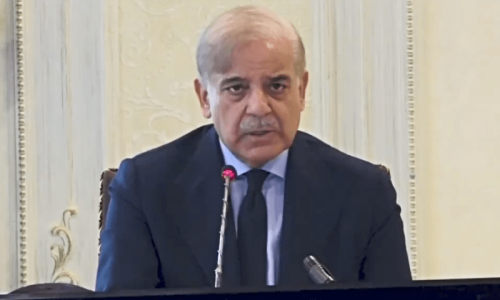WASHINGTON, Dec 27: The Taliban have established a command and control structure in the tribal areas and are using their “sanctuary” for regrouping, said a senior US official on Tuesday.
Assistant Secretary of State Richard Boucher, however, acknowledged at a briefing in Ottawa, Canada, that Pakistan was aware of the problem and was making concerted efforts to deal with it.
Mr Boucher, who looks after South and Central Asian affairs at the State Department, said the presence of Taliban forces in the tribal region was “one of the key items” on the US agenda.
A text of the statement, issued by the State Department on Wednesday, quoted him as saying that “the Taliban have been able to use these areas for sanctuary and for command and control and for regrouping and supply.” The United States, he said, was not only alarmed by this development but had also conveyed its concerns to Pakistan.
“We have been very clear with the Pakistani government that this is one of the key items on all our agendas – on our own agenda, on the Pakistani agenda, the Afghan agenda,” he said.
The US official said that to underscore the importance of this issue, President Bush invited Pakistani and Afghan leaders to the White House in September.
“The president not only met with each of them separately to discuss these border areas but met with them together to try to say we’ve got to deal with this problem together,” he said. “And I think there is a basic commitment to do that.”
The statement, however, shows a greater understanding of the problem than previous US statements on this issue did. Instead of simply singling out Pakistan for criticism, it emphasises the need for a joint strategy for dealing with the extremists.
The US official also noted that Kandahar, and not Pakistan’s tribal region, had always been thought of as the home of the Taliban.
“It’s vital for all of us, indeed, for the whole security of the Afghanistan-Pakistan region that Kandahar not be an area where the Taliban are allowed to operate freely and hold sway,” he said.
Disagreeing with a questioner who suggested that Pakistan was unwilling to deal with the terrorists, Mr Boucher said: “I wouldn’t say that. No, I mean we work very closely with Pakistan on all these issues.”
He said that Pakistan’s tribal region, like the bordering areas of Afghanistan, were difficult to handle because they had remained ungoverned for a long time.
“We understand that in some ways the issue on the Pakistani side is the same as the issue on the Afghan side. It’s extending government out to the edges of the country. And for a variety of historic and other reasons, Pakistan government’s authority has not held sway in the border areas,” he said. “And I think it’s important to understand that President Musharraf and the Pakistani government know that the Taliban is a threat to the region and to Pakistan.”
Mr Boucher said that not only had General Musharraf clearly identified the Taliban as a threat to his country; he had also made efforts to deal with this issue.
“They’ve taken action, military action and political action. They’ve taken action in terms of law enforcement,” said the US official, adding that Pakistan also has arrested Taliban fighters.
Mr Boucher said that Pakistan had a strategy for bringing prosperity to this area and the United States supported this strategy.
“They’ve taken action on the economic front and we’re helping them with that as well, to try to extend government authority but also to give a different economic opportunity to this region,” he said.
The State Department official also urged other countries to help Pakistan in implementing a new economic development plan for the tribal areas.
“We’re going to be helping with (this) and we hope others do as well,” he said.
The United States has agreed to establish economic opportunity zones along the Afghan-Pakistan border. Goods produced in these places can be sold duty-free in the United States, and Washington has urged the European Union and other prosperous nations to offer similar facilities.













































Dear visitor, the comments section is undergoing an overhaul and will return soon.